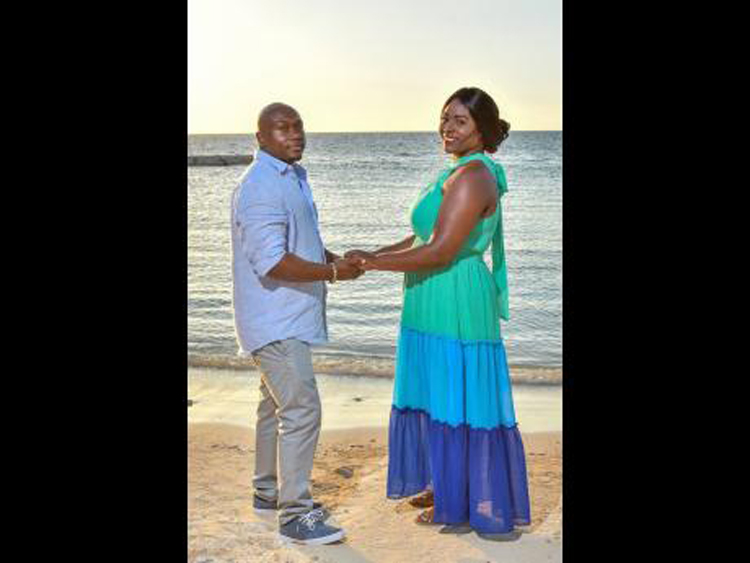(Jamaica Gleaner) COVID-19 has crippled travel to several destinations, cancelled thousands of conferences and disrupted millions of lives, but Demetrius Moye and Tanisha Bradley weren’t about to allow the global pandemic to derail their wedding.
The American couple, on their first trip to Jamaica, tied the knot yesterday at Sandals Montego Bay, one of the first resorts to reopen after the country closed its borders in March as part of measures to contain the spread of the dreaded coronavirus disease 2019 (COVID-19).
But Jamaica was not the couple’s first choice. Fate actually brought them here.
Originally booked for Antigua and Barbuda; then St Lucia, which was expected to reopen before Jamaica; then finally Royal Plantation in Ocho Rios, Jamaica, their final stop became Sandals Montego Bay.
“We were determined to get married, and it was worth every minute of the struggles getting here,” the couple told The Sunday Gleaner.
Engaged for three years, the pair, who hail from the Poconos in Philadelphia and who operate an ambulance service called As One EMS, arrived on the island on Wednesday, June 17, two days after the Sangster International Airport reopened its gates to visitors.
“COVID-19 pretty much influenced our wedding in Jamaica. In fact, COVID-19 tried to derail our wedding plans, but we won, and once we got here, there was nowhere else we would have wanted to commit our lives to each other,” they said, lauding the team at Sandals as some of the coolest they have ever met.
“They (the team) have gone out of their way to make sure we are comfortable, and as scary as seeing the Hazmat suits on arrival at the airport was, and the pain of having that swab pushed up into our nostrils, by the time we got to the resort that was erased,” Tanisha shared.
The couple is among a group of first-come visitors who have forced Jamaican stakeholders to adjust to an entirely new arrival process, literally reducing the airport’s dependency on paper-based records.
“We are seeing significant improvement in overall passenger processing time,” Shane Munroe, chief executive officer at MBJ Airports, operators of Sangster, confirmed three days after processing 1,500 passengers to the island.
GREATER USE OF TECHNOLOGY
He revealed that the major changes so far have seen greater use of technology, as tablets have replaced paper. There is also increased Wi-Fi usage for access to the JAMCOVID app, as well as a reduction of the processing points.
For Munroe, there has been greater coordination between agencies, and he welcomes the reintroduction of VIP Attraction’s Club MoBay personnel to assist passengers.
Other tourism stakeholders say they have put their toes in the water to operate within the new travel space, with close to 8,000 workers at Sangster International looking to get back to work and staff in a few hotels happy to return to earning a salary, albeit fearful about contracting the virus from visitors who may be positive.
Among the first group to arrive in week one of the reopening of the industry, were some 400 Jamaica-born visitors from the diaspora, back home to bury their loved ones.
That, too, has raised concerns among the populace, as Jamaicans reminisce on the first COVID-19 case in March, which was a Jamaican from the United Kingdom who interacted with hundreds of persons at a funeral, nine-night and other activities, as well as places she travelled to during her visit.
The positives and the need to return to some type of activity that will stimulate economic growth far outweigh the negatives, which were highlighted by Tourism Minister Edmund Bartlett last Thursday morning when he addressed the regional council that he chairs on the United Nations World Tourism Organization.
Revealing that already in the first quarter of the year, international tourism had recorded 67 million fewer arrivals and a loss of US$80 billion in exports, Bartlett told stakeholders on the digital platform during the briefing that the Americas was the third-hardest hit region, with international arrivals down by 15.2 per cent compared to the corresponding period in 2019.
NOT BUSINESS AS USUAL
Quoting figures from the Economic Commission for Latin America and the Caribbean, he said the region was facing the pandemic from a weaker position than the rest of the world.
Acknowledging that it could not be business as usual, Bartlett, outlining the loss sustained by Jamaica, said the projections point to J$108 billion for the fiscal year April 2020 to March 2021, and a fallout of $38.4 billion to the Government from direct revenue from the sector.
“Therefore, our policy responses demand innovative thinking to match the dynamism of this current threat to sustainable development. Effective recovery and the ‘new normal’ will be characterised by greater flexibility for the viability of businesses, particularly, micro, small and medium-sized tourism enterprises,” the minister stated.
He argued that border reopenings and re-engagement with the international community are necessary to advance national and global recovery.
Admitting that it was too early for any preliminary assessment of the decision to reopen the country to tourism in less than a week, the tourism minister said the Jamaican Government rests confident that it has considered all relevant and precautionary measures, including adoption of workplace protocols as well as tailored protocols for the tourism industry.
On social media, a number of visitors who experienced Jamaica’s COVID-19 border opening measures said they had to sanitise seven times before leaving the airport, and they were met on arrival by immigration and medical officers dressed in full PPEs (personal protective equipment) and Hazmat suits.
“Jamaica has taken this pandemic very seriously, and they are prepared with tests and equipment before the first positive reach their shores. They have not been wishy-washy, and that’s why their numbers are low,” said visitor Charmaine Johnston Bailey in support of the airport protocols.






